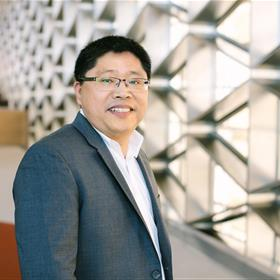主 讲 人:Zhiping Lai
主办单位:海洋科学与技术学院
时 间:2025年7月1日:下午15:30
地 点:H254
主讲内容:The accelerating demand for lithium – driven by its pivotal role in battery technologies and clean energy systems – highlights the urgent need for sustainable and scalable extraction methods. Conventional lithium sources, such as high-grade salar brines and hard rock deposits, are geographically constrained and environmentally intensive. In contrast, low-grade brine sources, including oilfield produced water, geothermal fluids, and seawater, represent a vast but largely untapped resource, hindered by their low lithium concentrations and complex ionic compositions.
In this talk, I will present two novel direct lithium extraction (DLE) technologies designed to selectively recover battery-grade lithium from low-grade brines. The first technology utilizes a ceramic membrane composed of solid-state lithium superionic conductors. This membrane selectively blocks all competing ions while allowing rapid transport of lithium ions. Using an electrodialysis configuration, we demonstrated successful extraction of battery-grade lithium from seawater containing only 0.2 ppm lithium, enriching it up to 10,000 ppm.
The second method involves a decoupled, membrane-free electrochemical cell that cycles lithium ions between iron-phosphate electrodes. The cell features spatially separated anode and cathode compartments that are electrochemically connected via a pair of redox electrodes. This innovative design enables efficient lithium extraction from challenging brines with Mg/Li molar ratios as high as 3000 and lithium concentrations as low as 20 ppm. Moreover, it harnesses the osmotic energy inherent in the brine to reduce energy consumption significantly.
We have successfully scaled both technologies to the pilot level and assessed their technical and economic feasibility using real oilfield-produced water provided by Saudi Aramco. These breakthroughs offer a transformative pathway toward building localized lithium supply chains in regions lacking conventional reserves. Additionally, they support global sustainability goals by enabling low-carbon, water-efficient lithium production. The broader implications for the energy transition and circular economy are particularly significant for petrochemical-rich countries aiming to diversify into clean energy materials.
报告人简介/Biography

Dr. Zhiping Lai is a Full Professor in the Chemistry and Chemical Engineering Program and Co-Chair of the Center of Excellence for Renewable Energy and Storage Technologies at King Abdullah University of Science and Technology (KAUST). He received his B.E. and M.S. degrees from Tsinghua University and his Ph.D. from the University of Massachusetts Amherst.
Dr. Lai’s research centers on the development of high-performance membranes derived from ordered porous materials, with applications in hydrocarbon separations, seawater desalination, wastewater treatment, energy storage, and the extraction of critical minerals.
He held the SABIC Chair Professorship from 2013 to 2016 and has been recognized with several prestigious honors, including the 2020 AIChE Institute Award for Industrial Gases, the Gold Medal at the 49th International Exhibition of Inventions in Geneva, and the 2024 Chinese Association of Innovation Award. He is widely regarded as a pioneer in the field of metal-organic framework (MOF) membranes and is also known for his groundbreaking work on zeolite membranes.
